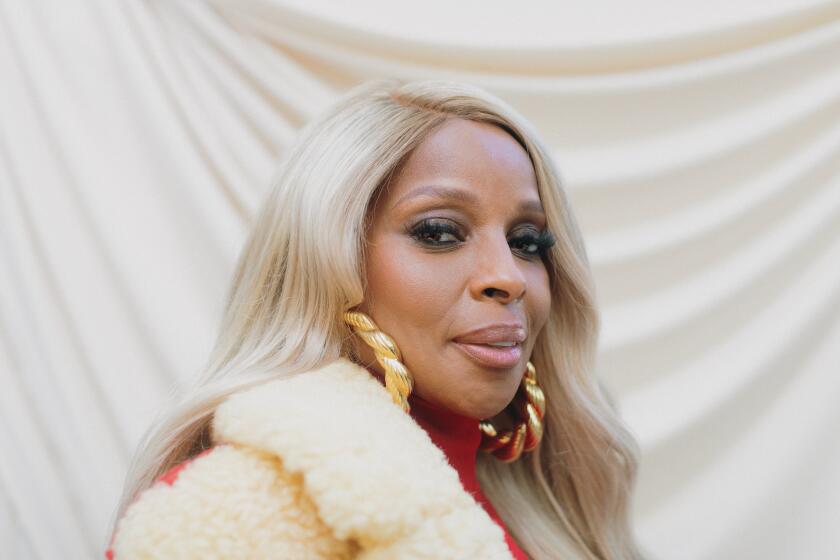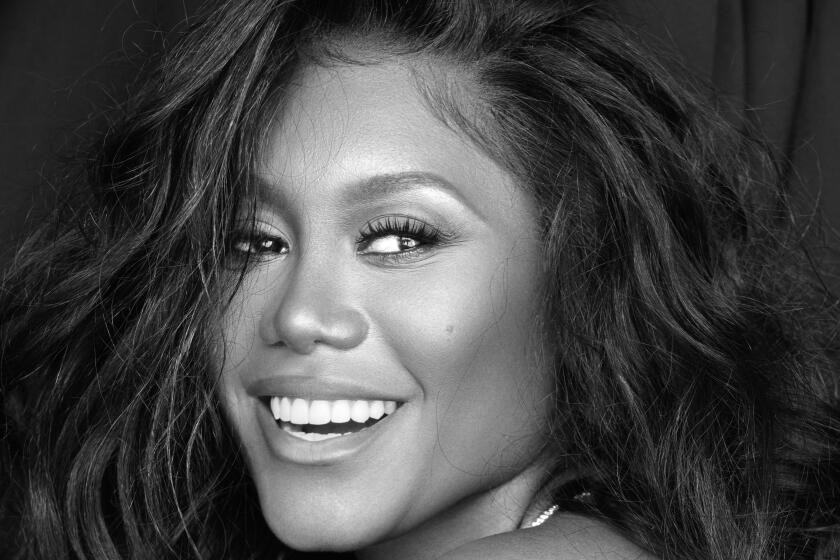- Share via
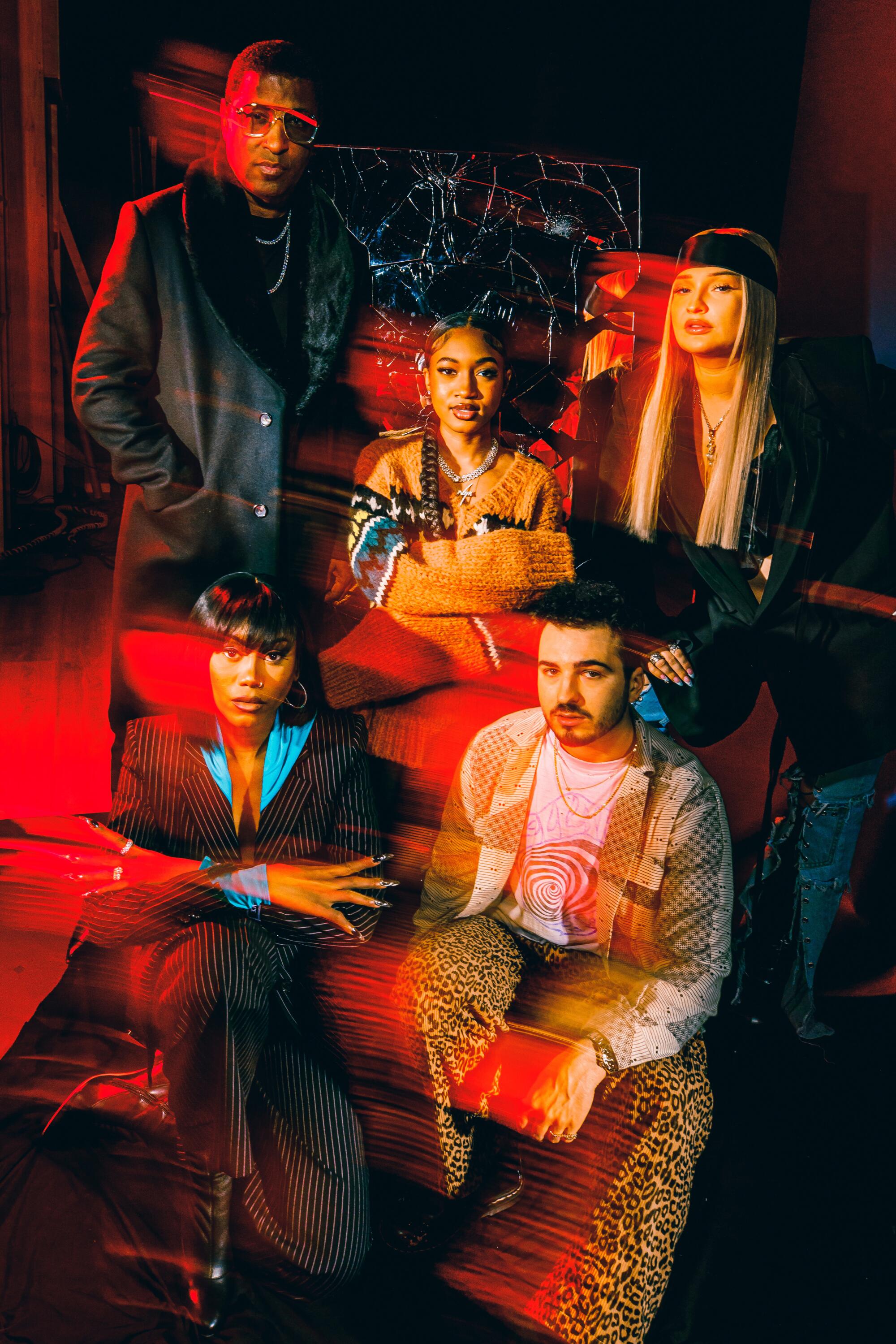
Midwestern chili comes with spaghetti. Giving oneself a manicure is harder than it looks. And husbands should get their wives a “re-up ring” around the seventh year of marriage.
These were some of the many tidbits of wisdom traded among the five musicians who gathered at The Times’ studio on a recent afternoon for a lively discussion of the work that led them to nominations for the 65th Grammy Awards.
Our panelists:
• Singer, songwriter and producer Kenny “Babyface” Edmonds, 64, who’s up for traditional R&B performance — his 50th Grammy nod in a career that stretches back to the mid-1970s — with his song “Keeps On Fallin’.”
• Singer and songwriter Muni Long, 34, nominated for best new artist, as well as R&B performance and R&B song for “Hrs & Hrs.”
• Singer and songwriter Kim Petras, 30, whose “Unholy” duet with Sam Smith is in the pop duo/group performance category.
• Songwriter Nija Charles, 25, nominated for the Grammys’ inaugural songwriter of the year prize for her work with Beyoncé (“Cozy”), Summer Walker (“Ex for a Reason,” “Throw It Away”) and Megan Thee Stallion and Dua Lipa (“Sweetest Pie”), among others.
• Songwriter and producer Blake Slatkin, 25, who co-wrote and co-produced “Unholy” and whose work on Lizzo’s “About Damn Time” and her “Special” LP earned him nods for record, song and album of the year.
As the five got acquainted, Slatkin eagerly peppered Babyface with questions about what it was like to be in the studio with Michael Jackson and Whitney Houston back in the day; Petras, who’s from Germany, told everyone about her addiction to horror movies. “All the fairy tales from home are so dark — they got me into spooky stuff,” she said to squeamish looks from Charles and Long. “I can’t do horror,” Charles said. “I’ll be hiding in the closet.”
Their varied tastes and hobbies reflected the fact that each panelist got into music in different ways, at different times and in different places — and that each followed his or her own path to the Grammys, set for Feb. 5 at Crypto.com Arena in Los Angeles. But after the small talk, all found common ground regarding the joys and the demands of creativity.
These are edited excerpts from the conversation, which will stream in video form Dec. 19 on the Amazon Music page on Twitch.
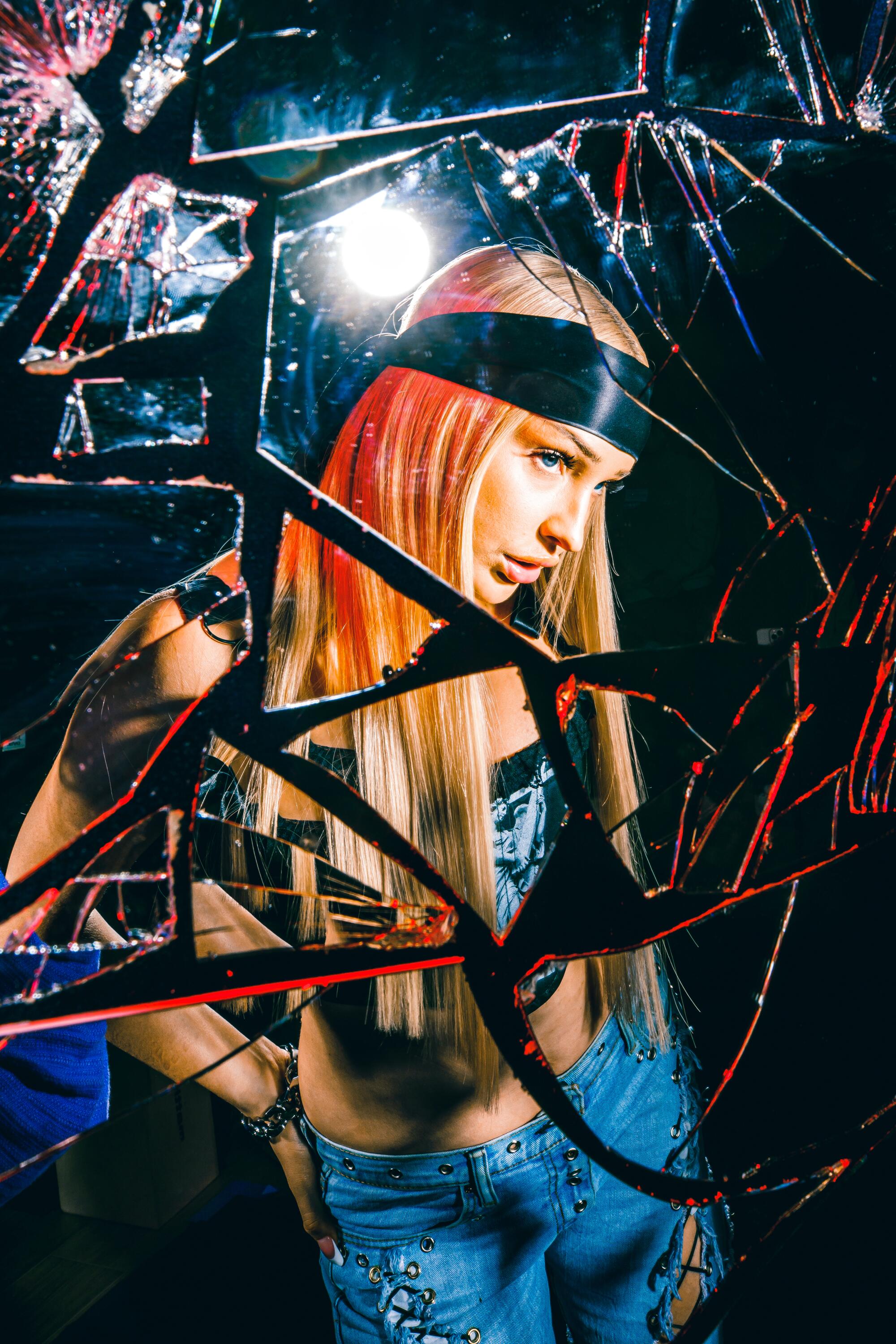
1. “It gives the power to the people”
Many of the songs nominated at the Grammys found life in one way or another on TikTok, which solidified its place this year as the most reliable hitmaking platform in music. Is TikTok’s importance a good thing or a bad thing?
Slatkin: Every big song I’ve ever had has been purely because of TikTok. Nothing matters marketing-wise, label-wise, budget-wise until kids decide that they love the song on TikTok. I’ve made songs where we spent zero dollars on studios, and I’ve made songs that took a lot of money to make, and it’s like it couldn’t matter less. Which to me is the coolest thing in the entire world because we all have an equal shot as anyone else to make something great that people love. I think it’s the best thing to happen to music in a long time.
“Unholy” took a pretty short trip from TikTok to No. 1 on Billboard’s Hot 100.
Petras: People were so creative and had so much fun with the song. It gives the power to the people. As an artist, I leak more things than I did before I was on TikTok because I’m just testing stuff out — like, “Do you guys like this vibe that I like? Should I keep going on this demo?” With “Unholy,” Sam and I did a little video of us listening to it in the studio, and it was pretty s— audio quality, just on the phone. But that’s what people liked about it — that it just felt like, “Hey, we tried making this song, see if you like it.”
Babyface: Radio and the record companies used to be the gatekeepers of what people could listen to or not listen to, so there’s so many people that never got the chance to even get their stuff heard. TikTok now opens that door where everybody gets a shot. And it’s still a million to one that someone’s gonna jump on it. But we’ve seen so many success stories that you have to take it seriously.
Mary J. Blige’s 6 nominations are a pleasant surprise; Nicki Minaj’s zero won’t sit well with the Barbz.
Who’s a musician who’s really figured out how to use TikTok?
Long: Charlie Puth. He’ll just, like, [taps rings against coffee cup] and make it into a beat.
Slatkin: And it’s the best song you’ve ever heard.
Long: I feel like I’m right there with him in the studio.
What’s it feel like to have your song turned into a snippet?
Long: It helps me sharpen my tool as a writer. I don’t try to make songs for TikTok, but I definitely make sure that there are clear pieces that people can use and interpret in their own way.
Slatkin: I think the snippetization encourages greatness because it’s like every part matters just as much as the chorus. The verse is also the chorus, and so is the pre- and so is the outro. To me as a songwriter and producer, it just makes me want to do everything I can to make every single second of the song the best it can possibly be.

2. “I hate making music alone”
Modern songwriting is highly collaborative in a way that seems to bewilder some folks. When Beyoncé’s “Renaissance” dropped, the veteran songwriter Diane Warren got a lot of flak after she tweeted, “How can there be 24 writers on a song?” You worked on Beyoncé’s song “Cozy,” Nija. Say a little about the process.
Charles: Number one, there might be a lot of writers because we’re using samples, so those older songs, the people on there also get credited. But with “Cozy,” Beyoncé wanted to make a song for all women, and I was just like, what can I think of for female empowerment? I usually go on with the melody first, but I was also just writing down lines: What’s gonna hit and make every woman feel it? I love to pull stuff from my everyday life, and I say “cozy” all the time. So I was just really thinking of a witty way to say that I’m really just comfortable with who I am — comfortable in my skin and with all the mistakes that I’ve made.
Blake, “About Damn Time” has four credited writers, not including those whose work was sampled.
Slatkin: I’ve always made music with my friends. I hate making music alone — it’s just not fun for me. I think “About Damn Time” sounds like as much fun as we had making it. Same with “Unholy.” We literally had a party in the studio while we were making it.
Petras: As a songwriter, I have so many friends that I’m like, this person is so good at this — I wanna bring some of that into my song.
Babyface: In terms of the million-people-on-a-song thing, it happens so much today because when people start a song, it goes through a process of trying to make it better, and in that process, so many different people touch it. And they actually bring something to the table that matters. Their names are only there because they helped move it forward. No one’s taking a ride. I can promise you, ain’t nobody letting anybody take rides.
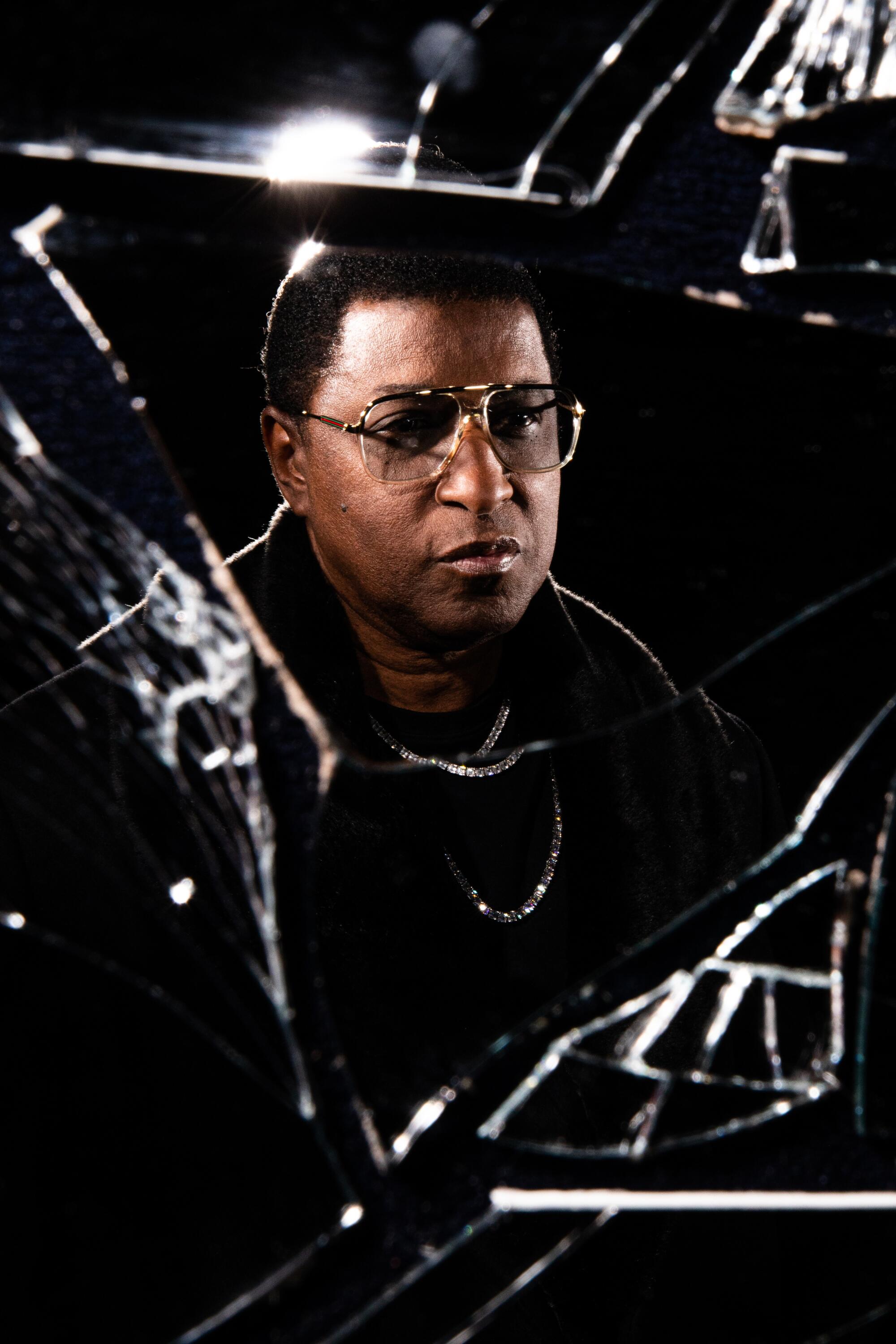
3. “The question of the ‘it’ factor”
Let’s say there are two approaches to modern pop stardom: the Taylor Swift model, in which you’re constantly communicating with your fans, and the Beyoncé model, in which you let your music do the talking. Which is the right one for each of you?
Long: You have to do what’s most authentic to you. People accept Beyoncé not talking to you because she don’t do that in person [laughs]. Me, I’m a very personable person — I’m always taking over every room: “How you doing? You good? You want something to drink?” So I’m always in the comments.
Babyface: There’s the question of the “it” factor. And the “it” factor is a crazy thing because sometimes it’s about being honest and being who you are, but sometimes it’s being the exact opposite. Certain artists that I’ve known, once you actually go behind the curtain, they’re completely different than this persona that they appear to be. But they knew what they had to be in order to shine.
Who’s somebody who turned out to be different than you expected?
Babyface: I can’t say. Well, I won’t say — put it that way.
Long: Right?! You’re trying to get us in trouble.
Babyface: It’s much harder to do that today because there’s nowhere to hide. Social media has changed it all. Beyoncé, she’s a classic superstar. She’s too big to have to answer to anybody at this particular point. And that’s a great place to be. But I don’t think that an artist starting out can make that same move. You can’t be mysterious because the kids want to know.
A Grammys best new artist contender, Long is no stranger to the music biz, as a (country!) artist and songwriter. But her hit ‘Hrs and Hrs’ marked a new era.
Nija, as a songwriter, does putting yourself out there feel natural?
Charles: It’s natural because of social media. That’s how I even got into songwriting — showcasing what I was doing on Instagram and Twitter and now with TikTok. Just yesterday, somebody [on the street] was like, “Oh, you’re the girl from TikTok!” I’m like, OK, I’ve been Grammy-nominated, but I’m the girl from TikTok.
What about you, Blake?
Slatkin: I’m actually the opposite. My instinct is never to be in the spotlight. I work with artists that are so themselves and so much bigger than their music that there’s nothing I can bring to the table without them. It’s all what I can do to be a part of their story. Like Sam [Smith], for example — I was such a big fan of them since I was 10 years old and I was covering their songs on piano. To be a part of a moment like “Unholy” that’s so different from what they normally do was special.
What Sam Smith songs did you play?
Slatkin: I did “I’m Not the Only One.” I did “Stay With Me.”
These were good covers or —?
Slatkin: Terrible. But I was learning.
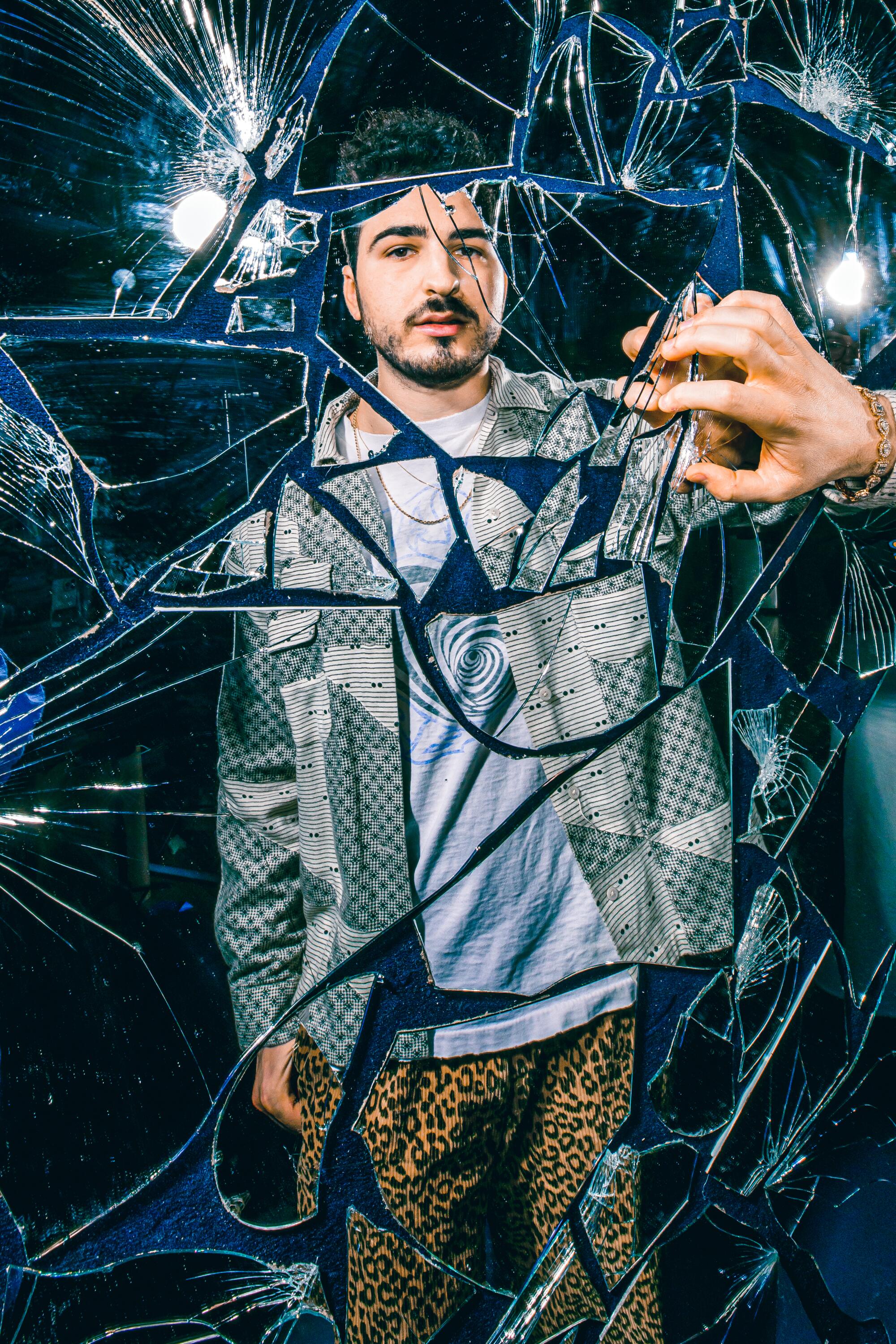
4. “There’s an audience for me”
Kim, “Unholy” made history this year when it became the first song by an openly nonbinary person and an openly trans person to top the Hot 100. Is music becoming more inclusive?
Petras: Yes, for sure. I started out as a songwriter, and with songwriting, all that matters is: Is your music good? When people [outside music] met me, it was like, “Oh, you’re transgender,” and it was this big thing. And I feel like in the music community, it was just like, “You sound dope.” As an artist, it was all about proving that there’s an audience for me.
You took a moment as a presenter at November’s American Music Awards to note the recent mass shooting at a gay club in Colorado Springs. How do you reconcile the gains in the music industry with that kind of violence and with some of the anti-LGBTQ legislation we’ve seen this year?
Petras: I felt really emotional at the American Music Awards. As a fan of music, I could always be myself at gay clubs. No one loves pop music more than [people at] gay clubs. That was my safe place as a kid where I could go to to feel accepted and feel like myself. So, you know, that [clubgoers in Colorado Springs] could be my friends. That could be me. That could be my entire community. And I want to protect that. I want to do something to make that not happen again. I mean, gun control in general is insane in the U.S.A.
Does “Unholy” go off in the club?
Petras: It goes off. There’s a Disclosure remix, which I love.
Is the club a good way to determine what’s happening with your songs?
Long: Oh, my god, yes. I haven’t experienced it fully yet with my song. It’s kind of unheard of to have a ballad be in the club. But to hear people on Instagram screaming the entire song, word for word ? I just can’t wait to be in the crowd.
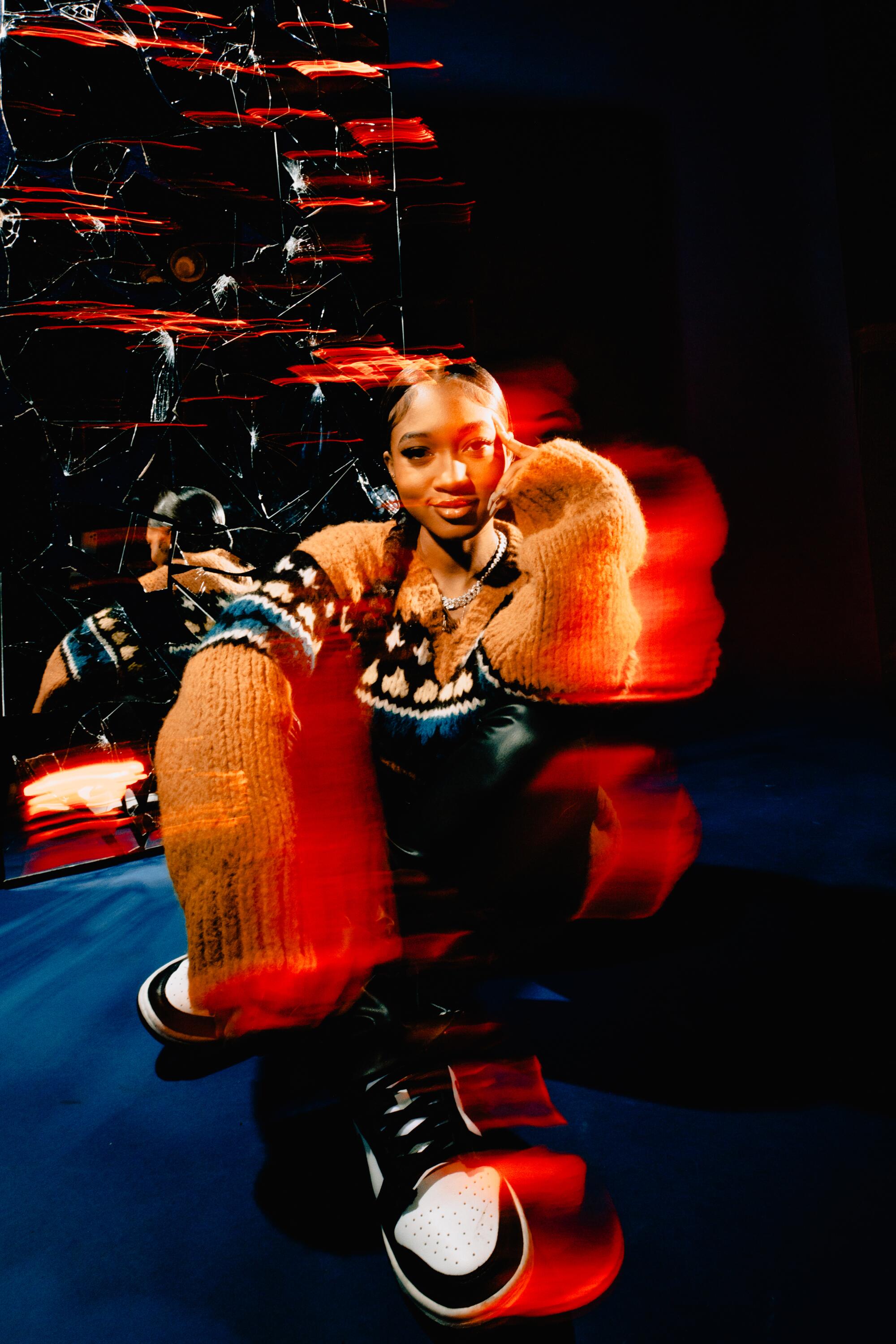
5. “Remembering self-care”
What’s the worst part of your job?
Long: Not sleeping. I love to sleep.
Charles: Growing up, you idolize the people you work with, and you never want to tell anybody no. And you kind of forget that you’re a human at the end of the day. You forget about yourself because you put your work first or you just want to seize every opportunity. The hardest part of the job is remembering self-care.
Petras: Vocal rest [before a show].
Long: It’s so hard to shut up.
Petras: It’s the worst. I type things into this little app and it speaks it for me, but I hate not being able to use my voice. I’ve had nodules before, and I used to write way higher songs than you can technically perform in a row all the time. So I’ve had to learn how to navigate the vocal cords.
Long: I need that app.
Have all of you had experiences where you’ve damaged or lost your voice?
Long: I completely lost my voice in 2018. It was gone. I couldn’t sing at all. Turns out I had blocked sinuses. I went and got it fixed, but it’s a scary feeling. I had to learn to sing around it. That’s where this new style of singing came from — this soft thing that people interpreted as sexy, but really it was just because I couldn’t hit any other notes.
Babyface: Small blessings, because it sounds great that way. I remember talking to Eddie Levert from the O’Jays, I asked him, “What do you do when you go out [onstage] every night?” He has this hard voice, and I said, “I know they’re expecting you to kill it every night, but there’s no way with that voice you’re gonna be able to.” And he said, “It’s not what comes out of you — it’s the intention of what you’re giving them.” Even if you can’t hit the notes, it’s whether you tried.

6. “It needs to hurt”
Any memorable aha! moments from your nominated songs? One of those instances where the song’s not working and then something just unlocks?
Long: If it ever feels too much like work — like I’m trying to shove a square peg in a round hole — I’ll just be like, next. It should never feel forced.
Petras: I’ve done that. I’m very German that way — like, it needs to hurt. But a lot of the great stuff comes when you’re having fun and it just happens.
Slatkin: That’s what it was for us on “About Damn Time.” We had been working on this little nugget of inspiration that we had — working in the biggest, most expensive studio with every keyboard, every guitar. And there was one day where we couldn’t get to that studio, and we ended up going to this little room that’s Lizzo’s favorite place to record. We were kind of lost on the song, and in the second verse we took out all the music so it was just the bass and drums. And I watched Lizzo’s eyes light up and go in the booth and freestyle the second verse — the “In a minute …” part that’s kind of the hook of the song. That moment of inspiration, you have no idea where it came from, and you couldn’t replicate it in a million years if you tried. Everyone was like, “Nobody move — let’s just let this come out.” And after it came out, I mean, I wanted to throw up and s— and cry at the same time.
Last thing: Present company excluded, whose music excited you this year?
Charles: Ice Spice. The bars that she’s saying is just like how my homegirls would talk back home. It’s like a conversation on a drill beat.
Petras: I love Shygirl. Check out “BB,” one of my favorite songs. I love her sonic world — techno mixed in with her flows.
Slatkin: PinkPantheress. And there’s a girl named Hemlocke Springs who put out a song called “Girlfriend.” She produced it all by herself. It’s kind of all I listen to.
Long: I’m obsessed with Jacob Collier. He’s like a mad scientist — I really wanna work with him. GloRilla is my guilty pleasure. I just love that she’s like the people’s champ. Everybody’s rooting for her.
Babyface: I really like the writing of Steve Lacy. It feels very honest and intricate and musical. It’s so nice to hear that coming from a younger artist today, and the coolest part about it is that it’s working. That’s inspiring.
More to Read
About this story
Photo assisting by Ethan Benavidez
The biggest entertainment stories
Get our big stories about Hollywood, film, television, music, arts, culture and more right in your inbox as soon as they publish.
You may occasionally receive promotional content from the Los Angeles Times.
